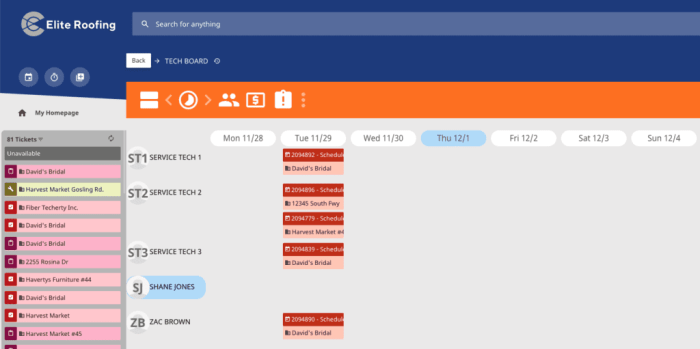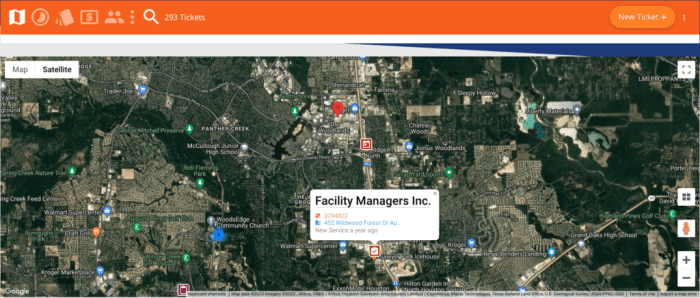CRM software for roofing is revolutionizing how roofing companies manage their business. No longer are piles of paperwork and disorganized spreadsheets the norm. Modern CRM systems offer powerful tools to track leads, manage projects, and improve customer relationships, leading to increased efficiency and profitability. This allows roofing businesses to focus on what matters most: delivering high-quality workmanship and exceptional customer service.
Efficient CRM software is crucial for any roofing business, streamlining operations from initial lead generation to final invoice. This is especially true for roofing contractors, who often juggle multiple projects simultaneously. For those seeking a solution specifically tailored to their needs, consider exploring the options available at crm software for roofing contractors to improve your overall roofing business workflow and customer management.
Ultimately, the right CRM can significantly boost the profitability and efficiency of your roofing company.
These systems provide a centralized hub for all customer information, from initial contact to completed projects and beyond. Features like automated email marketing, appointment scheduling, and reporting dashboards provide valuable insights into business performance, enabling data-driven decision-making. This ultimately contributes to a more streamlined and profitable operation.

Source: centerpointconnect.com
In the competitive roofing industry, managing leads, projects, and customer relationships effectively is crucial for success. A robust Customer Relationship Management (CRM) system can be the difference between struggling to keep up and thriving. This detailed guide explores the benefits of CRM software specifically tailored for roofing businesses, helping you choose the right solution and maximize its potential.
Why Roofing Contractors Need a CRM
Roofing businesses, often juggling multiple projects simultaneously, face unique challenges. From initial lead generation to final payment and ongoing maintenance, efficient organization is paramount. A dedicated CRM offers several key advantages:
Improved Lead Management
- Centralized Database: Store all lead information – contact details, project specifics, communication history – in one easily accessible location. No more lost leads or duplicated efforts.
- Lead Scoring & Prioritization: Prioritize high-potential leads based on factors like project size, urgency, and customer engagement. This ensures your sales team focuses on the most promising opportunities.
- Automated Lead Follow-up: Set up automated email sequences and reminders to nurture leads and maintain consistent communication throughout the sales process. Never miss a follow-up again.
Enhanced Project Management
- Task Management: Assign tasks to team members, set deadlines, and track progress efficiently. This ensures projects stay on schedule and within budget.
- Document Management: Store all project-related documents – contracts, estimates, permits, photos – securely in the CRM, readily accessible to all relevant parties.
- Progress Tracking: Monitor project milestones and identify potential delays early on, allowing for proactive adjustments and minimizing disruptions.
Improved Customer Communication
- Centralized Communication: Maintain a complete history of all customer interactions, ensuring consistent and informed communication across your team.
- Automated Communication: Send automated appointment reminders, project updates, and thank-you notes to enhance customer satisfaction.
- Improved Customer Service: Quickly access customer information and project details to address inquiries efficiently and professionally.
Increased Efficiency and Profitability
- Reduced Administrative Overhead: Automate repetitive tasks, freeing up valuable time for sales and project management.
- Improved Sales Conversion Rates: Efficient lead management and targeted follow-up increase the likelihood of closing deals.
- Better Resource Allocation: Optimize resource allocation based on project needs and team capacity, maximizing efficiency and profitability.
Choosing the Right CRM for Your Roofing Business: Crm Software For Roofing
Selecting the right CRM involves careful consideration of your specific needs and budget. Look for features such as:
Essential Features:
- Lead Management Capabilities: Robust tools for capturing, tracking, and nurturing leads.
- Contact Management: Easy storage and retrieval of customer information.
- Project Management Tools: Features for task assignment, deadline setting, and progress tracking.
- Reporting and Analytics: Data-driven insights into sales performance, customer behavior, and project efficiency.
- Integration Capabilities: Ability to integrate with other business tools, such as accounting software and scheduling apps.
- Mobile Accessibility: Access your CRM from anywhere, anytime.
- Customization Options: Ability to tailor the CRM to your specific workflows and business processes.
CRM Options for Roofing Companies:, Crm software for roofing
Several CRMs are well-suited for roofing businesses, each offering unique features and pricing models. Some popular choices include:
- HubSpot CRM: A popular, user-friendly option with a free plan and scalable paid options. Offers strong marketing automation features.
- Zoho CRM: A comprehensive CRM with a wide range of features, including project management and inventory management. Offers various pricing plans to suit different business sizes.
- Salesforce Sales Cloud: A powerful and highly customizable CRM, ideal for larger businesses with complex needs. Known for its robust features but can be more expensive.
- Less Annoying CRM: Focuses on simplicity and ease of use, making it a good option for smaller roofing businesses.
Implementing Your CRM: A Step-by-Step Guide
Successfully implementing a CRM requires careful planning and execution. Follow these steps for a smooth transition:
- Assess Your Needs: Identify your specific requirements and challenges. What are your biggest pain points? What features are essential?
- Choose the Right CRM: Research different options and select a CRM that aligns with your needs and budget.
- Data Migration: Transfer existing customer and project data into your new CRM. This process requires careful planning and execution to avoid data loss.
- Team Training: Provide comprehensive training to your team on how to use the CRM effectively. Ensure everyone understands the system’s functionalities and how to utilize them efficiently.
- Process Optimization: Adjust your workflows to leverage the CRM’s capabilities. Streamline processes and eliminate redundancies.
- Monitor and Adjust: Regularly monitor the CRM’s performance and make adjustments as needed. Track key metrics to assess the impact of the CRM on your business.
Frequently Asked Questions (FAQ)
- Q: How much does roofing CRM software cost? A: The cost varies widely depending on the chosen software, features, and number of users. Some offer free plans, while others have monthly or annual subscription fees ranging from a few hundred to thousands of dollars.
- Q: Can a CRM integrate with my existing accounting software? A: Many CRMs offer integration capabilities with popular accounting software, allowing for seamless data flow between systems. Check the specific CRM’s integration options before purchasing.
- Q: How long does it take to implement a CRM? A: Implementation time depends on the size of your business, the complexity of the CRM, and the amount of data migration involved. It can range from a few weeks to several months.
- Q: What are the key performance indicators (KPIs) to track with a CRM? A: Key KPIs include lead conversion rates, average deal size, sales cycle length, customer satisfaction, and project completion rates.
- Q: What if my team is resistant to adopting a new CRM? A: Address team concerns proactively through clear communication, comprehensive training, and demonstrating the CRM’s benefits. Highlight how it can simplify their tasks and improve their efficiency.
Conclusion
Investing in a CRM is a strategic move for any roofing business aiming to enhance efficiency, improve customer relationships, and boost profitability. By carefully selecting the right software and implementing it effectively, you can transform your operations and gain a competitive edge in the market. Don’t let outdated methods hold your business back – embrace the power of CRM technology today!
Call to Action
Ready to take your roofing business to the next level? Explore the CRM options mentioned above and choose the one that best fits your needs. Start your free trial today and experience the difference a dedicated CRM can make!
Implementing CRM software for your roofing business can significantly enhance operational efficiency and customer satisfaction. By centralizing customer data, automating tasks, and providing valuable insights, CRM systems empower roofing companies to grow their business strategically. The investment in a robust CRM solution is an investment in the long-term success and sustainability of your roofing enterprise, leading to a stronger bottom line and a more satisfied clientele.
Clarifying Questions
What are the key features of CRM software for roofing?
Key features typically include lead management, project tracking, customer communication tools (email, SMS), scheduling, reporting and analytics, and integration with other business software.

Source: centerpointconnect.com
How much does CRM software for roofing cost?
Pricing varies widely depending on the features, scalability, and vendor. Expect to find options ranging from affordable monthly subscriptions to more enterprise-level solutions with higher costs.
How long does it take to implement CRM software?
Implementation time depends on the complexity of the software and the size of your business. Expect a period of setup, data migration, and training, which could range from a few weeks to several months.
What type of training is needed for CRM software?
Most vendors offer training resources, including tutorials, webinars, and sometimes on-site training. The level of training needed will depend on the software’s complexity and your team’s technical proficiency.
